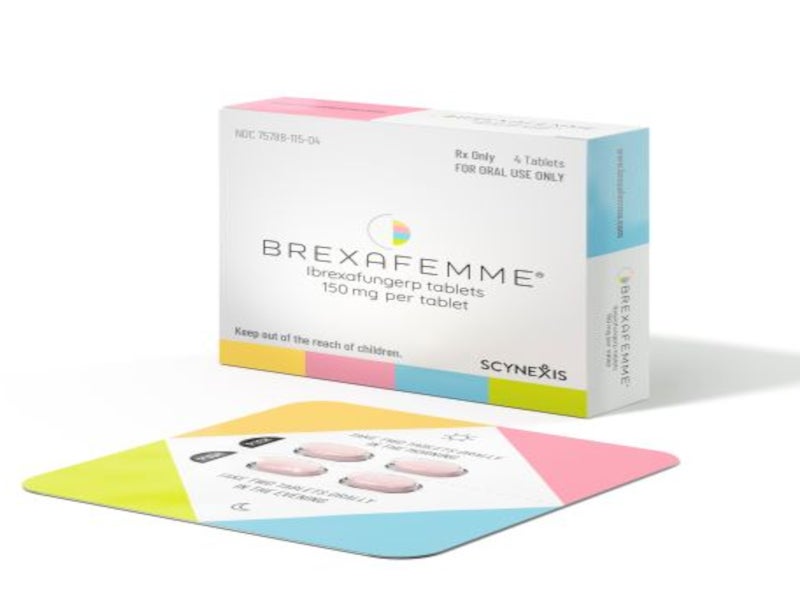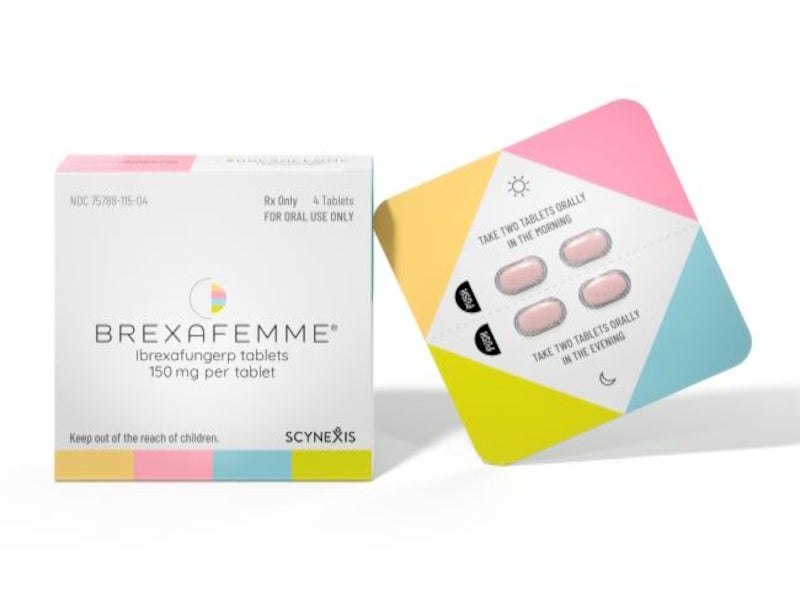Brexafemme® (ibrexafungerp tablets) is a first-in-class triterpenoid antifungal drug indicated for the treatment of vaginal yeast infection (vulvovaginal candidiasis (VVC)) in adult and postmenarchal paediatric female patients.
Developed by US-based biotechnology company Scynexis, Brexafemme is the first approved drug in a novel antifungal class in more than 20 years. It is available as purple, oval-shaped, biconvex tablets containing 150mg of ibrexafungerp.
In February 2021, Scynexis collaborated with Amplity Health, a pharmaceutical commercialisation company, to support Brexafemme’s launch and commercialisation in the US.
Researchers at Scynexis are conducting a Phase III, global, randomised, double-blind, placebo-controlled clinical trial named CANDLE in patients for the prevention of recurrent VVC.
A supplemental new drug application (NDA) is scheduled to be submitted to the US Food and Drug Administration (FDA) in the first half of 2022.
Regulatory approvals for Brexafemme
In May 2018, Brexafemme was granted qualified infectious disease product (QIDP) and fast track designations by the FDA for the treatment of VVC and the prevention of recurrent VVC.
An NDA for oral ibrexafungerp for the treatment of VVC was submitted to the FDA in October 2020. This was accepted for priority review in December 2020 and approved in June 2021.
The drug also holds QIDP, fast track and orphan drug designations for invasive candidiasis (IC) and candidaemia, which is the common form of IC, as well as invasive aspergillosis.
Vulvovaginal candidiasis causes and symptoms
VVC is a vaginal yeast infection caused by the overgrowth of Candida species, particularly Candida albicans. It is the second most frequent cause of vaginitis (vaginal inflammation), affecting up to 75% of women at least once in their lifetime.
VVC can cause significant morbidity, such as discomfort, pain, itching, burning sensation in the genital area, decreased sexual pleasure and activity, psychological distress, stress, depression and anxiety, embarrassment, decreased physical activity, and loss of productivity.
The typical symptoms of VVC are itching, vaginal discomfort, irritation, excoriation of the vaginal mucosa and atypical vaginal discharge.
Brexafemme’s mechanism of action
Brexafemme inhibits glucan synthase, an enzyme involved in the production of a crucial component of the fungal cell wall, 1,3-β-D-glucan.
The drug exhibits concentration-dependent fungicidal efficacy against Candida species according to time-kill studies, which analyse the impact of an antimicrobial agent on microorganisms over time. Brexafemme maintained its antifungal efficacy in vitro when tested at the normal vaginal pH of 4.5.
Brexafemme has shown in vitro and in vivo antifungal efficacy against multidrug-resistant infections, including azole and echinocandin-resistant bacteria.
Clinical trials on Brexafemme
The FDA’s approval of the drug was supported by two Phase III, randomised, placebo-controlled, double-blind, multi-centre clinical trials, VANISH-303 and VANISH-306.
The VANISH programme evaluated the safety and efficacy of oral ibrexafungerp 600mg in single-day treatment, as well as assessing its tolerability profile in women with VVC.
The VANISH-303 clinical trial was conducted in the US, in which 190 patients were administered 600mg of Brexafemme (two 150mg tablets per dose every 12 hours) and 100 patients received a placebo.
The VANISH-306 trial was conducted in the US and Bulgaria, with 189 patients receiving Brexafemme and 89 patients receiving a placebo.
The efficacy was evaluated by the clinical outcome at the test of cure (TOC) visit. The complete resolution of signs and symptoms was determined as a complete clinical response (VSS score of 0).
In the VANISH-303 trial, 50% of patients receiving Brexafemme had a complete clinical response at TOC, whereas 63.5% of patients receiving Brexafemme achieved a complete clinical response at TOC in the VANISH-306 trial.
A statistically significantly higher percentage of patients treated with Brexafemme achieved a negative culture at TOC and a complete clinical response at follow-up.
The most frequent adverse reactions observed in patients in the two clinical trials under the VANISH programme were diarrhoea, nausea, stomach pain, dizziness and vomiting.





